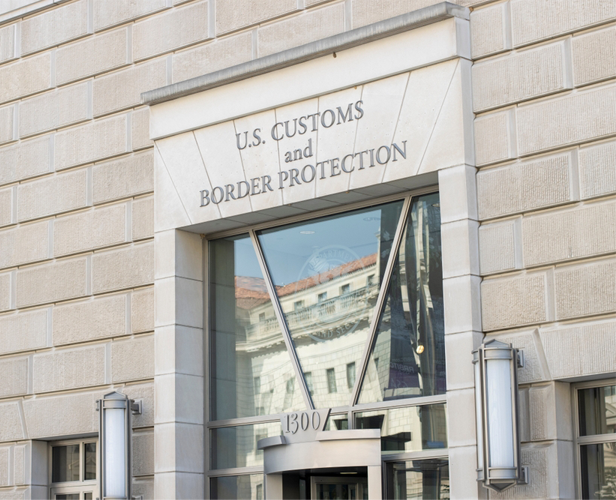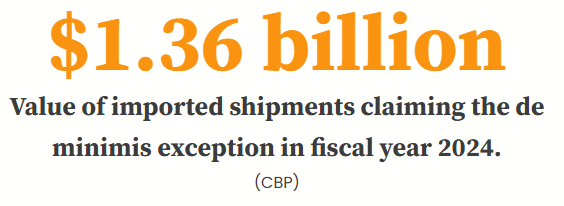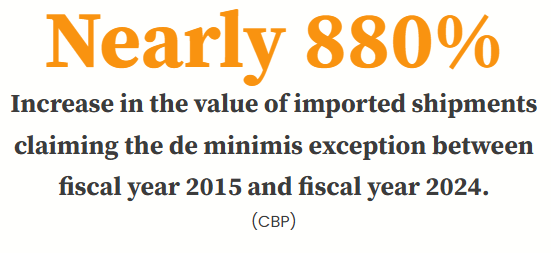U.S. Customs and Border Protection (CBP) has proposed a new rule that would subject certain imported goods valued at below $800 to import duties – a move that, if implemented, could make it more expensive for promo companies and other importers to bring such products stateside and potentially compel changes to importing practices.
Currently, a de minimis duty exemption provides a loophole in which so-called low-value shipments – those below $800 per person per day – are not slapped with import duties. CBP is keen to change this for imported goods to which section 201, 232 and 301 tariffs apply, saying that doing so is in the interest of national security and pivotal to safeguarding American businesses and workers from unfair trade practices.

The exemption of such goods from duties or taxes has undermined American businesses and workers and flooded ports of entry with foreign-made products, making CBP’s work of screening these goods for security risks more difficult, according to the agency.
Potential Promo Impacts
Promo supply chain experts with whom ASI Media spoke in the wake of CBP’s Jan. 21 proposal said they didn’t see massive impacts to promotional products sourcing if the rule takes effect, though they did note some merch importing could be affected.
One reason such executives said they do not anticipate widespread impacts is because suppliers tend to import in larger quantities and not look to use the de minimis rule much.
“This duty exception is very helpful for e-commerce companies that ship direct from factory to consumer, like Amazon and Shein, but for our industry the model is not quite as applicable,” Pat Noonan, chief product officer at Counselor Top 40 supplier SanMar (asi/84863), told ASI Media.
Tim Behling, vice president of supply chain and sustainability at Counselor Top 40 supplier Gemline (asi/56070), expressed a similar view, though added that promo importers that are bringing stateside smaller-batch/custom orders, for instance, could be affected had they wanted to use the exception.

“Most overseas shipments that we do are larger quantities, and it wouldn’t make sense to split them into smaller shipments to take advantage of the de minimis rule,” Behling told ASI Media. “I do, however, know that some suppliers do smaller custom orders, so this may be something they utilize for their customers.”
Beyond small-batch/custom orders, Noonan noted other scenarios in which nixing the de minimis exception could affect promo importers. “If a supplier established a warehouse in Mexico [or Canada] and was using it to fill distributor orders in the United States, then this would be a major impact,” Noonan said.
Yuhling Lu, CEO/co-owner of Counselor Top 40 supplier Ariel Premium Supply (asi/36730), picked up a similar thread.
“Suppliers who operate in Canada and Mexico who may use the rule to imprint small-value orders in those countries and then ship across the border without tariff implications will feel an impact,” Lu, a member of Counselor’s Power 50 list of promo’s most influential people, told ASI Media. “There are also some suppliers who ship small-value orders direct from China to avoid the tariffs.”
Indeed, as Lu noted, there are for sure certain industry companies – suppliers and distributors who import direct – who have sought to use the de minimis exception.
Joseph Shusterman, founder of California-based distributor BlueMark (asi/142002), has said the loophole was one he anticipated leveraging when importing direct from overseas factories given the likelihood of import tariff increases during President Donald Trump’s second term.
“If imports valued under $800 are no longer exempt from duties under tariffs 201, 232 and 301, it could lead to increased costs for importers who currently rely on these exemptions to manage their expenses,” Shusterman told ASI Media.
For instance, section 301 tariffs on China-made products currently range from 7.5% to 100% – and Trump is considering adding additional 10% levies on China-manufactured goods by Feb. 1. If CBP’s rule change is enacted, the $800-and-below-in-value products that had previously avoided these tariffs but that are on the tariff lists would now be subject to the duties, ratcheting up the expense of importing them.
There are other possible impacts, too. “This change,” Shusterman said, “might force a reevaluation of sourcing strategies.”
CBP is hoping it does, saying importers are likely to reduce per-unit shipping costs by consolidating items in bulk shipments rather than splitting them up to take advantage of the duty-free loophole. That will make CBP’s job easier, the agency said.
“This consolidation results in fewer higher-value entries, where multiple identical items can be reviewed by CBP officers at the same time,” the proposed rule read.

Reasons for the Proposed Rule Change
CBP says that eliminating the exception will help agents better protect against the inflow of illicit drugs, counterfeit goods and other illegal items, among other positives for the United States.
Over the last decade, importers have increasingly utilized the de minimis loophole.
In fiscal year 2024, shipments claiming the de minimis exception tallied a total value of $1.36 billion, up approximately 880% from fiscal year 2015, according to CBP. “This exponential increase has created challenges for CBP’s effective enforcement of U.S. trade laws, health and safety requirements, intellectual property rights and consumer protection rules,” CBP said.
The agency said low-value e-commerce shipments are of particular concern because of the large volume of such importations daily and the more limited data that the organization receives regarding such shipments, “which make it increasingly difficult for CBP to target and block illicit synthetic drugs such as fentanyl and raw synthetic drug materials and related manufacturing equipment from entering the country.”
There’s a 60-day public comment period where anyone can chime in with their thoughts on the proposal, which has been published in the Federal Register. After that, CBP will take into consideration the comments before issuing a potential final rule.


